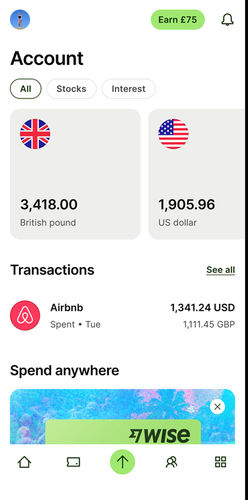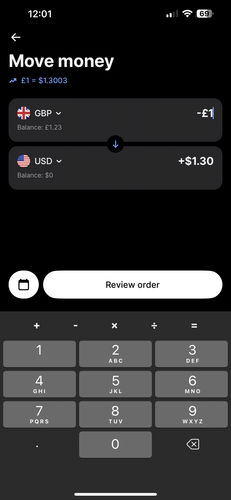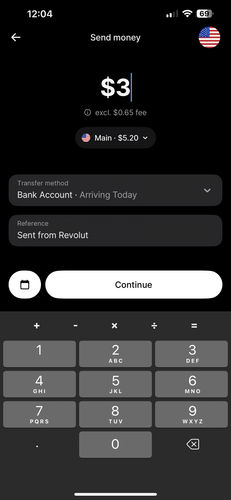Send money to Sweden
"Over 16 million customers use Wise, mostly for their excellent mobile app, transparent fee structure & use of mid-market rates. Now increasingly used for larger transfers."
"Xe has over 30 years of currency exchange experience, and is one of the most reputable names on the market. 200 countries, 100 currencies, & funds often received in seconds."
"Over 16 million customers use Wise, mostly for their excellent mobile app, transparent fee structure & use of mid-market rates. Now increasingly used for larger transfers."
"Currencies Direct have over 30 years of global money transfer expertise. Award winning service with a TrustPilot rating of 4.9. Lock-in rates for the future or trade 24/7 on web or mobile."
"Revolut has 50+ million customers globally. You can hold up to 36 currencies in the app and send money quickly in 70+ currencies to 160+ countries."
"OFX have been helping individuals and businesses send money for over 25 years. Transfer in 50+ currencies to 170+ countries, with 24/7 phone access to currency experts."
"Key Currency offers a personal service with a dedicated account manager. There are no transfer limits or fees which is perfect for larger send amounts."
"Xe has over 30 years of currency exchange experience, and is one of the most reputable names on the market. 200 countries, 100 currencies, & funds often received in seconds."
"Regency's UK-based account management team has vast experience. Get support on all kinds of transfers, from overseas property transactions to business payments & more."
"Remitly focuses on sending money to friends and family in Asia, Africa and South America. Wide coverage and well-suited to regular transfers home."
"Lumon has cared for over 69,000 customers since 2000. Get support for larger transfers from dedicated currency specialists."
"Xoom, a PayPal service, allows you to send money in more than 160 countries. You can send cash for over-the-counter pickup or home delivery, as well as send by bank transfer or debit card."
"Securely send money to and from 150+ countries and 20+ currencies. Same-day transfers avaialble on most major currencies."
"Fast, secure internatinal transfers with no fees and transparent rates. They offer a free currency card for use at home and abroad."
"Send money to over 40 destinations online and in the mobile app."
"Paysend has transparent fees and rates, with transfer sent within seconds to your recipient's bank. They also have global 24/7 support for any enquiries, and bank-level security."
"Moneycorp is an established player in the market, with a focus on private clients and corporates. Make overseas payments in over 120 currencies and 190 countries."
"Moneygram is a well established service with over 80 years in the sector. They support over 200 countries worldwide and have over 440,000 retail locations."
The best way to send money to Sweden: Wise
After reviewing and testing 18 money transfer providers supporting SEK transfers, we found Wise to be the top choice for money transfers to Sweden as of May 2025.
Wise appeared in 95.1% of SEK transfer searches and ranked as the best option among providers supporting Swedish Krona transfers.
With quick transfers, a low markup of 0% on SEK exchange rates, and a low fee of $45.35, Wise offers the ideal balance of cost, speed, and features for SEK transfers.

How to get the best rate when sending money to Sweden
Everything you need to know when sending money to Sweden
Don’t just settle for the most popular option—always compare.
Most transfers/payments to Sweden include fees and add a markup on the ‘real’ SEK exchange rate.
The total cost of your transfer to Sweden can vary based on your deposit and delivery methods, the amount of SEK transferred, and where you're located.
Our comparison covers 18 money transfer services that support Swedish Krona transfers, helping you find the best fit for your needs.
The cheapest way to send money to Sweden: Revolut
From the 18 companies tested in the past 6 months, Revolut consistently offers the cheapest money transfer SEK to Sweden.
Revolut appeared in 70% of our searches as the most cost-effective option, being 0.4% cheaper than the second cheapest provider.
Revolut charges $0 per transfer to Sweden and applies a 0.2% markup on the SEK exchange rate.
For the best value, use a Bank transfer deposit to maximize the amount of SEK received.



Fastest way to send money to Sweden: Wise
Our data shows that Wise came up as the fastest way to transfer SEK in 38% searches on MoneyTransfers.com over the past six months.
Wise charges $12.52 in fees on average and adds a 0% markup, which is also 0% cheaper than the next fastest option.
Pair it with a Bank transfer deposit to get your SEK abroad fast and cheap.
Our ‘fastest’ way to transfer money to Sweden includes the transfer amount, deposit method, and transfer and withdrawal times.

Easiest way to send money to Sweden: Wise
Our 6-month analysis shows that Wise came up as the top-rated provider for transfers to Sweden in 95.1% of the searches.
By “easiest”, we mean the service that is easy to get started with, is fully transparent and offers a good balance of cheap and fast transfers.

Sending large amounts of SEK to Sweden
Based on our 6-month analysis, Wise consistently ranked as the top choice for large SEK transfers. They charge $45.35 per transfer to Sweden and apply only a 0% markup on the SEK exchange rate.
Whether you’re purchasing property, paying tuition fees in SEK, planning a wedding in Sweden, or making business payments, Wise ensures a smooth and secure process.
When sending large amounts of Swedish Krona to Sweden, consider factors like transfer limits, markup on the SEK rate, customer service, and any legal, tax, or government-imposed restrictions in Sweden.

The costs of sending money to Sweden
The cost of SEK transfers depends on where your location, amount, funding and withdrawal methods, transfer fees, and the markup added on top of the SEK exchange rate.
Exchange rate markup
The exchange rate markup is the percentage added to the mid-market rate (the "real" SEK rate) by the service provider.
For example, Wise offers one of the best exchange rates by applying a -0.03% markup on the USD-SEK exchange rate.
This means you receive 10.7412 SEK - -0.03% for every US Dollar sent.
Transfer fees
Transfer fees to Sweden can be either fixed, percentage-based, or a combination of both.
Suppose you want to send $2,000 to Sweden (SEK).
After analyzing 18 services supporting SEK, Xoom appears to have the lowest fee of $0 per transfer to Sweden.
Deposit method
The way you fund your SEK transfers can significantly affect the cost.
For example, using a bank transfer can cost up to $4 , debit cards can go up to $556.84 per SEK transfer, while credit cards can go as high as $0 per transfer to Sweden.
Bank transfer is the overall cheapest deposit method for sending money to Sweden.

Getting the best SEK rate when sending money to Swedish Krona
The exchange rate is the value of the Swedish Krona (SEK) compared to other currencies. Since it consistently moves up and down, sending at the high will give your receiver more SEK compared to the low.
In the past 6-months, the SEK exchange rate reached:
An average rate of 10.7412 Swedish Krona per US Dollar
A high of 11.2831 SEK per USD
And a low of 9.6841 SEK per US Dollar
The SEK/USD exchange rate has seen some movements. Making a transfer when the rate is close to 11.2831 SEK/USD will result in more SEK received.
Wise is our top recommendation for sending Swedish Krona, offering a markup of 0% which is 0% better than the next cheapest option.
Get notified when it’s the best time to transfer Swedish Kronas
Sign up for our rate alerts, and we’ll notify you when it’s the best time to send SEK!
Payment methods available to fund your transfer to Sweden
How we analyze the market
We track the cost, speed, and product offerings of the leading money transfer services available in Sweden.
Our comparison engine and algorithms evaluate providers based on over 25 factors, including transfer fees, ease of use, exchange rates, mobile apps, transfer times & customer support.
We also consider how these services are rated on platforms like TrustPilot, AppStore, and Google Play, giving you a comprehensive view of what to expect.
This thorough analysis helps you get the best available deal - every time you want to move money to Sweden.
We also provide unbiased and detailed reviews of all the top money transfer companies. You can use these reviews to find the best service for your needs when sending money to Sweden
For a deeper understanding of our commitment to integrity and transparency, we invite you to read our editorial policy document.

Related transfer routes
Send money from Sweden
Keep your money safe
Making sure your funds are safe when transferring to Sweden is really important. Ensure you send money to the recipients in Sweden you know and trust.
Always choose providers that are regulated by financial authorities.
If you don’t know what the key regulatory bodies are in Sweden, please refer to our directory of financial regulators worldwide.
FAQs
Find answers to the most common questions on our dedicated FAQ page.



.svg)










.svg)























